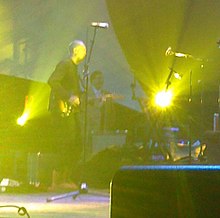
Lewis Allan Reed was an American musician and songwriter. He was the guitarist, singer, and principal songwriter for the rock band The Velvet Underground and had a solo career that spanned five decades. Although not commercially successful during its existence, the Velvet Underground came to be regarded as one of the most influential bands in the history of underground and alternative rock music. Reed's distinctive deadpan voice, poetic and transgressive lyrics, and experimental guitar playing were trademarks throughout his long career.

Jamaaladeen Tacuma is an American jazz funk avant-garde bassist, composer and producer born in Hempstead, New York. He was a bandleader on the Gramavision label and worked with Ornette Coleman during the 1970s and 1980s, mostly in Coleman's Prime Time band.

The Raven is the nineteenth solo studio album by American rock musician Lou Reed, released on January 28, 2003 by Sire Records. It is a concept album, recounting the short stories and poems of Edgar Allan Poe through word and song, and was based on his 2000 opera co-written with Robert Wilson, POEtry.

Transformer is the second solo studio album by American recording artist Lou Reed. Produced by David Bowie and Mick Ronson, the album was released on November 8, 1972 by RCA Records. It is considered an influential landmark of the glam rock genre, anchored by Reed's most successful single, "Walk on the Wild Side", which touched on controversial topics of sexual orientation, gender identity, prostitution and drug use. Although Reed's self-titled debut solo album had been unsuccessful, Bowie had been an early fan of Reed's former band the Velvet Underground and used his fame to promote Reed, who had not yet achieved mainstream success.
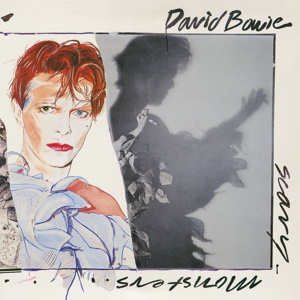
Scary Monsters (and Super Creeps), also known simply as Scary Monsters, is the fourteenth studio album by the English musician David Bowie, released on 12 September 1980 through RCA Records. His first album following the Berlin Trilogy (Low, "Heroes" and Lodger), Scary Monsters was Bowie's attempt at creating a more commercial record after the trilogy proved successful artistically but less so commercially.
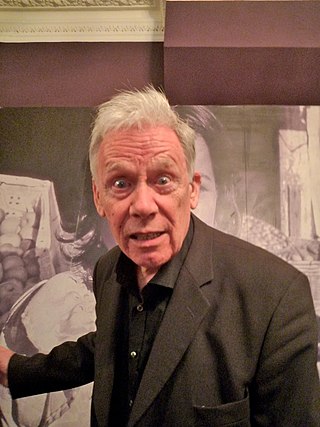
Brian Keith "Herbie" Flowers was an English musician specialising in bass guitar, double bass and tuba. He was a member of groups including Blue Mink, T. Rex and Sky and was also a prolific session musician.

Ziggy Stardust: The Motion Picture is a live album by the English musician David Bowie, released in October 1983 in conjunction with the film of the same name. The music was recorded during the Ziggy Stardust Tour at the Hammersmith Odeon in London on 3 July 1973, although the album was not issued by RCA Records until 1983. Prior to that it had existed in bootleg form, notably His Masters Voice – Bowie and the Spiders From Mars' Last Stand.
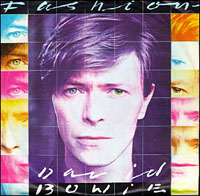
"Fashion" is a song by the English musician David Bowie from his 14th studio album Scary Monsters (1980). Co-produced by Bowie and Tony Visconti and recorded from February to April 1980 at New York and London, it was the last song completed for the album. Originating as a reggae parody titled "Jamaica", "Fashion" is a post-punk, dance and funk track structurally similar to Bowie's "Golden Years". King Crimson guitarist Robert Fripp contributed lead guitar.

The Buddha of Suburbia is the 19th studio album by the English musician David Bowie, originally released on 8 November 1993 through Arista Records in the United Kingdom and Europe. The project originated following an interview between Bowie and novelist Hanif Kureishi during a press tour for Black Tie White Noise (1993), where Bowie agreed to compose music for an upcoming adaptation of Kureishi's novel The Buddha of Suburbia (1990). After making basic tracks, Bowie decided to turn the project into a full album. Working with musician Erdal Kızılçay, recording took place at Mountain Studios in Montreux, Switzerland and was completed in six days; Mike Garson contributed piano overdubs.
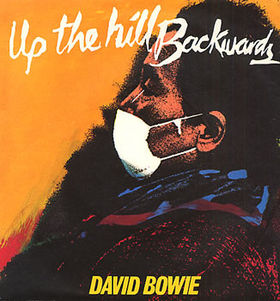
"Up the Hill Backwards" is a song by the English musician David Bowie, released on his 1980 album Scary Monsters . It was later issued by RCA Records as the fourth and final single from the album in March 1981. Originally written under the title "Cameras in Brooklyn", the song was recorded between February and April 1980 at the Power Station in New York City and Good Earth Studios in London. The recording features backing vocalists, guitar contributions from Robert Fripp and acoustic guitar played by co-producer Tony Visconti. Lyrically, the song concerns the struggles of facing a crisis, partially influenced by Bowie's divorce from his wife Angie. Musically, the song contains numerous time signature changes and a Bo Diddley-inspired beat.
"Teenage Wildlife" is a song written by David Bowie in 1980 for the album Scary Monsters . Running at almost seven minutes, the song was the longest track on Scary Monsters, and Bowie's longest composition since "Station to Station" (1976), although it was surpassed in length by later tracks such as 2003's "Bring Me the Disco King" and 2016's "Blackstar".
"Scream Like a Baby" is a song written by David Bowie. It appears on the 1980 album Scary Monsters .
"The Loneliest Guy" is a song written by David Bowie in 2003 for his album Reality. It's a slow-tempo minimalistic piece in which, according to James E. Perone, "Bowie's character also lives in denial: in spite of the shards of glass that he finds near his windows, the solitary life he lives, and 'all the pages that have turned,' he expresses the belief that he is not 'the loneliest guy' in the world, but, rather, 'the luckiest guy'." The biographer also writes: "The slow, solemn pace of the piece, the long phrases sung with a slowly pulsing vibrato suggest a profound sadness."
"Bring Me the Disco King" is a song written by David Bowie in the early 1990s, and recorded three times, although only the last recording was released, as part of Bowie's Reality album in 2003. A remix was also released in 2003 as part of the Underworld movie soundtrack.
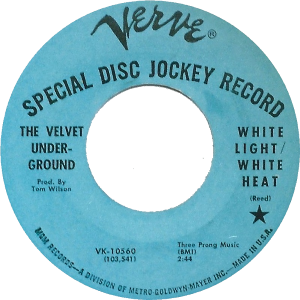
"White Light/White Heat" is a song recorded by the American rock band the Velvet Underground. It was released as a single in late November 1967 with the B-side "Here She Comes Now". The following year it appeared as the title track on their second studio album of the same name.

Fo Deuk Revue is an album by David Murray released on the Canadian Justin Time label. Recorded in 1996 and released in 1997, the album features performances by Murray with Darryl Burgee, Ousseynou Diop, Assane Diop, Craig Harris, Robert Irving III, Abdou Karim Mané, Oumar Mboup, Hugh Ragin, Doudou N'Diaye Rose, Moussa Séné, El Hadji Gniancou Sembène and Jamaaladeen Tacuma. The album features a wide array of vocalists including Amiri Baraka, Amiri Baraka Jr., Didier Awadi and Amadou Barry from Positive Black Soul, Tidiane Gaye, Hamet Maal and Junior Soul.

"Ashes to Ashes" is a song by the English singer-songwriter David Bowie from his 14th studio album, Scary Monsters (1980). Co-produced by Bowie and Tony Visconti, it was recorded from February to April 1980 in New York and London and features guitar synthesiser played by Chuck Hammer. An art rock, art pop and new wave song led by a flanged piano riff, the lyrics act as a sequel to Bowie's 1969 hit "Space Oddity": the astronaut Major Tom has succumbed to drug addiction and floats isolated in space. Bowie partially based the lyrics on his own experiences with drug addiction throughout the 1970s.
Tombs is an American heavy metal band from Brooklyn, New York, formed in 2007. Thus far, the group has released five full-length records: Winter Hours, Path of Totality, Savage Gold, The Grand Annihilation, and Under Sullen Skies.

Urban Mythology Volume One is the debut album by American experimental power trio Free Form Funky Frēqs, featuring guitarist Vernon Reid, bassist Jamaaladeen Tacuma, and drummer G. Calvin Weston. It was recorded during the summer of 2007 at Fenix Studios in Staten Island, New York, and was released in 2008 by Thirsty Ear Recordings.

Hymn of the 3rd Galaxy is the third album by American experimental power trio Free Form Funky Frēqs, featuring guitarist Vernon Reid, electric bassist Jamaaladeen Tacuma, and drummer Grant Calvin Weston. It was recorded during 2020–2021 at the musicians' home studios, and was released in 2022 by Ropeadope Records.
